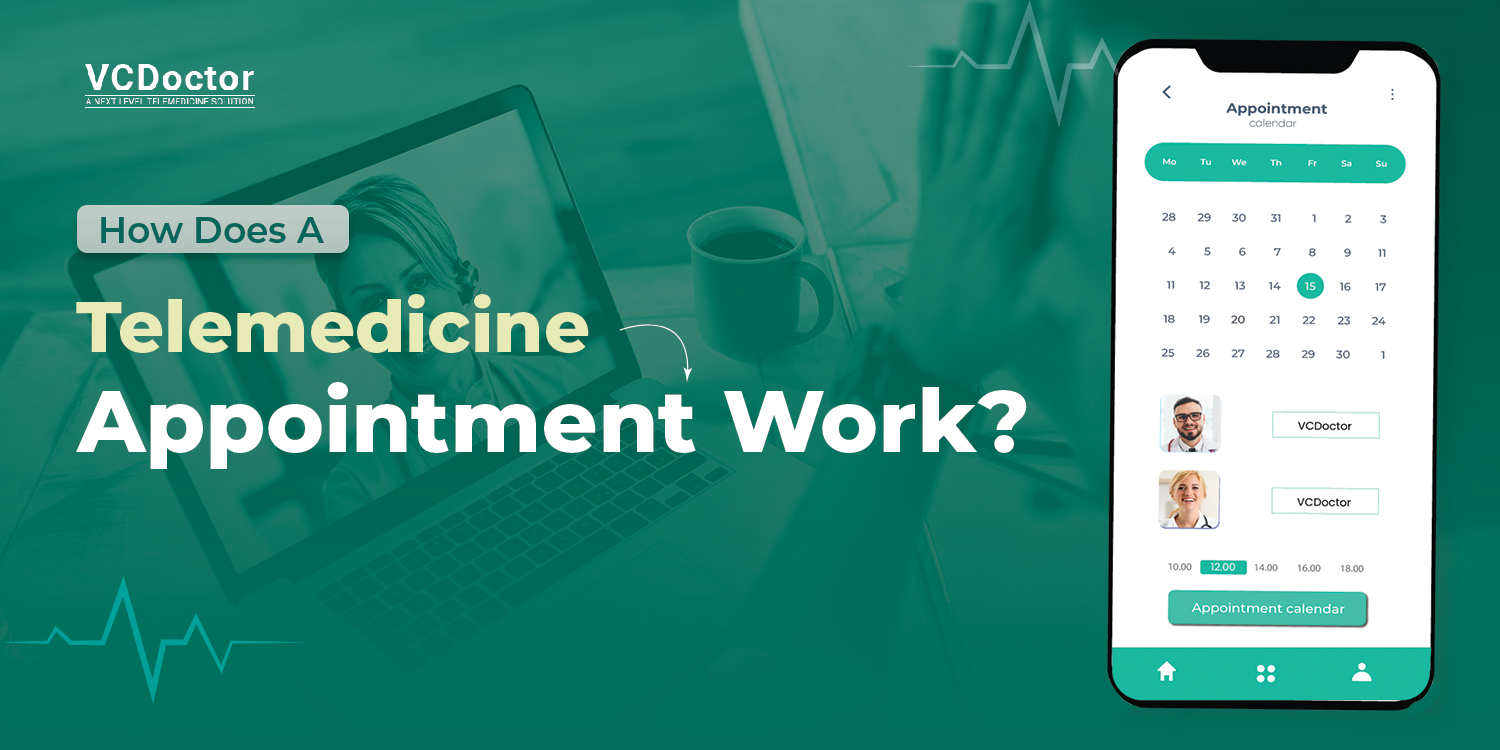How Does a Telemedicine Appointment Work?
The world experienced a lockdown after the widespread coronavirus. This made it nearly impossible to seek medical services. That is when the telemedicine industry boomed! Before COVID 19, telemedicine services were used by limited people. However, a significant rise of telemedicine market size is expected to reach $451.4 billion million by 2032. The statistics clearly show the hype around telemedicine. One feature of telemedicine that became a head-turner for everyone is the telemedicine appointment feature.
Patients can book appointments remotely to get healthcare services. If you are eager to know how telemedicine appointments work in detail, we have got you covered. This article is a complete guide on telemedicine appointments. Here we go!
Introduction to Telemedicine
Telehealth or telemedicine is the use of electronic information to offer quality healthcare services from a distance. Telemedicine uses different mainstream technologies like videoconferencing and wireless communications. Health experts and doctors examine patients’ symptoms, using the telemedicine services. Additionally, they monitor health conditions and suggest a tailored treatment plan. Further, continuous care and follow-ups are done to get the best results. Since telemedicine includes conducting video conferencing, it enhances overall patient satisfaction and provides the best healthcare quality.
An Overview of Telemedicine Appointment
Telemedicine appointments are virtual consultations where doctors provide necessary medical care to patients remotely without meeting them personally using telemedicine appointments. During the appointment, both parties can discuss health problems through video conferencing, secure messaging, and phone calls.
The appointment starts with scheduling it using the telemedicine software. Before it begins, a patient must complete an online form highlighting personal and medical details and all relevant documents. A few minutes before the scheduled appointment, the patient logs in to the software and joins the consultation with their chosen doctor. Patients share their symptoms, medical problems, and other concerns during the telemedicine appointment.
Based on the diagnosis, a comprehensive treatment plan is suggested. The provider also reviews medical records or images, conducts a virtual examination, and provides further evaluation or treatment recommendations. For a successful telemedicine experience, sit in a quiet environment. Additionally, prepare a comprehensive list of questions to discuss with health providers.
How Does A Telemedicine Appointment Work?
Here is the step-by-step process of work telemedicine appointment work:
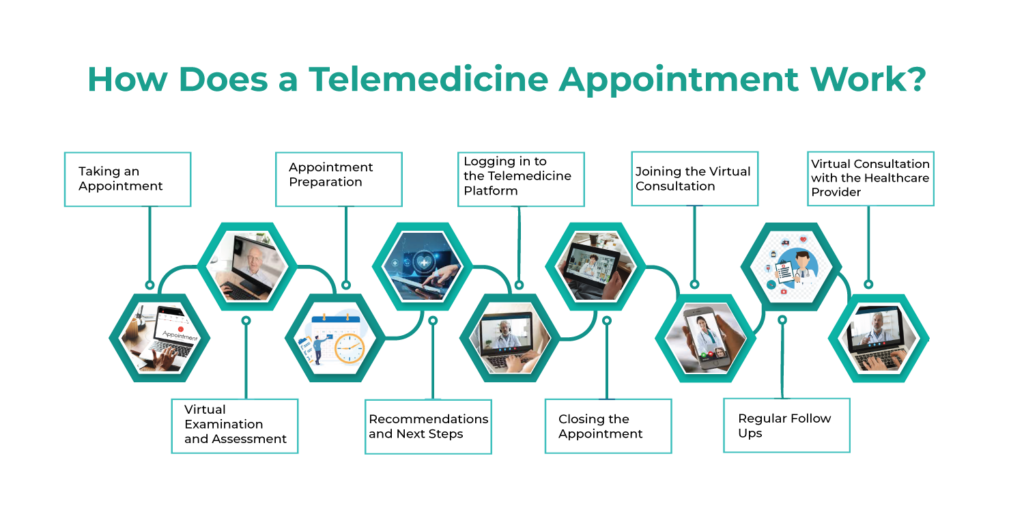
1. Taking an Appointment
On the telemedicine platform, schedule an appointment with the doctor. Fix an appointment after going through different doctor’s profiles. Based on their profiles, you can choose your preferred health expert.
2. Appointment Preparation:
Once the appointment is scheduled, the patient will receive a confirmation message containing personal details. These include time, date, and instructions to access the telemedicine appointment. Patients must also be asked to complete online forms featuring all personal and medical history information. Also, upload relevant images and documents before the appointment.
3. Logging in to the Telemedicine Platform:
On the appointment day, patients should log in to the telemedicine platform developed by telemedicine startups a few minutes before the scheduled time. You must assess the platform through a web browser on a computer.
4. Joining the Virtual Consultation:
At the scheduled time, patients begin their virtual consultation with the physician. Patients may be required to enter a virtual waiting room or establish a direct connection with the provider, contingent upon the telemedicine platform for clinics being utilized.
5. Virtual Consultation with the Healthcare Provider:
Patients and healthcare providers will communicate using the encrypted messaging apps, phone conversations, and video conferences, amongst other methods. Patients can talk to the provider about their symptoms and available treatments during the consultation.
6. Virtual Examination and Assessment:
During the telemedicine appointment, your doctor will conduct an in-depth virtual examination and assessment based on the appointment nature of the appointment. This includes reviewing medical images and records offered by the patient. You must ask different questions about medical history and symptoms and inspect areas of concern through video consultation.
7. Recommendations and Next Steps:
The doctor may offer recommendations for further treatment based on assessment. This includes ordering diagnostic tests and prescribing medications. Further, they may refer patients to doctors and recommend lifestyle changes.
8. Closing the Appointment:
Following the consultation, the medical professional may review the main ideas covered, address any last-minute queries, and, if needed, give directions for follow-up treatment. A description of the visit and any pertinent paperwork or medications may be sent electronically to the patient.
9. Regular Follow Ups:
Once the telemedicine appointment is complete, patients will get follow up communications from the doctor. These include treatment adherence instructions and reminders for upcoming appointments. It also includes requests for additional information.
Benefits of Telemedicine Appointment
The significant benefits of telemedicine appointments are:
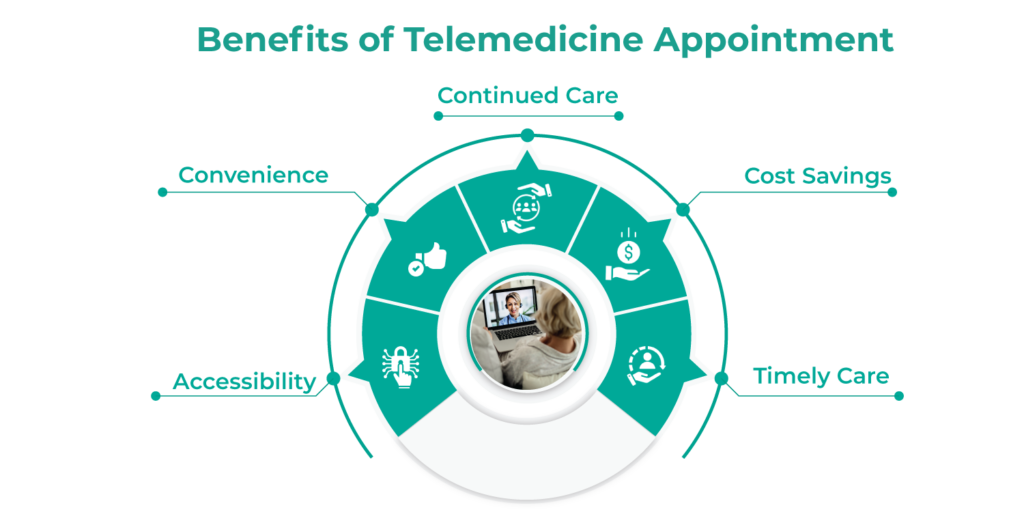
1. Convenience
Telemedicine appointments minimize the need to travel and waiting rooms. This allows patients to contact doctors from their home or workplace. This eliminates any inconvenience and saves a lot of time.
2. Accessibility
People who live in underserved and rural areas cannot access quality healthcare services. Telemedicine appointments promise easy access to healthcare services for everyone. Also, it is useful for people with transportation barriers and mobility problems. Patients connect with doctors remotely, overcoming all geographical problems. This ensures you get high-quality medical services promptly.
3. Cost Savings
Compared to personal visits, telemedicine appointments today are highly affordable. This is because there are no travel or parking expenses involved. Patients also eliminate indirect expenses like time off from work to attend appointments.
4. Timely Care
Through telemedicine urgent care, patients can receive timely medical services. This avoids any delays in treatments and eliminates wait time. If you have emergencies or urgent medical concerns, a telemedicine appointment is handy.
5. Continued Care
Through the telemedicine applications, patients can continuously communicate with their doctors. Further, they can take follow-up therapies to treat health conditions. This continuous care reduces related risk factors.
Limitations of a Telemedicine Appointment
Some major limitations of a telemedicine appointment are:
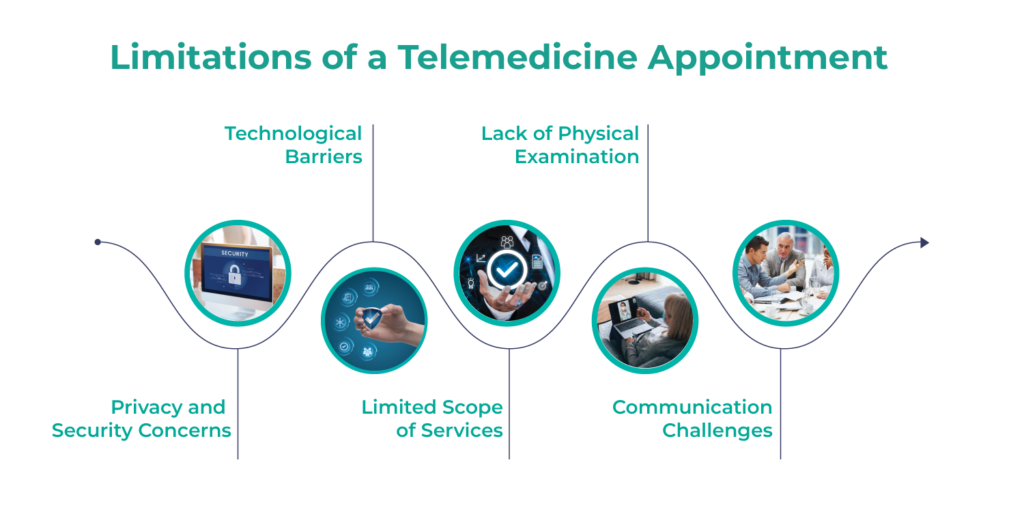
1. Technological Barriers
Telemedicine appointments are conducted through a reliable internet connection. Some people face technological problems while running appointments. Additionally, you need electronic devices like smartphones and computers.
2. Lack of Physical Examination
Telemedicine appointments are conducted online. Therefore, there is no personal connection. This limits the doctor’s ability to assess some health conditions properly and accurately.
3. Privacy and Security Concerns
Privacy and security issues arise when private medical data is sent via digital networks. Concerns over the privacy of their medical records may arise from patients during telemedicine consultations.
4. Limited Scope of Services
Some medical services like diagnostic tests and surgical procedures require physical presence because these cannot be conducted online through telemedicine appointments.
5. Communication Challenges
Technical difficulties or a lack of nonverbal signs might make telemedicine appointments difficult to communicate. This creates a gap between both the parties, making the entire process complicated.
Factors to Consider Before Conducting an Appointment
Some factors to consider are:
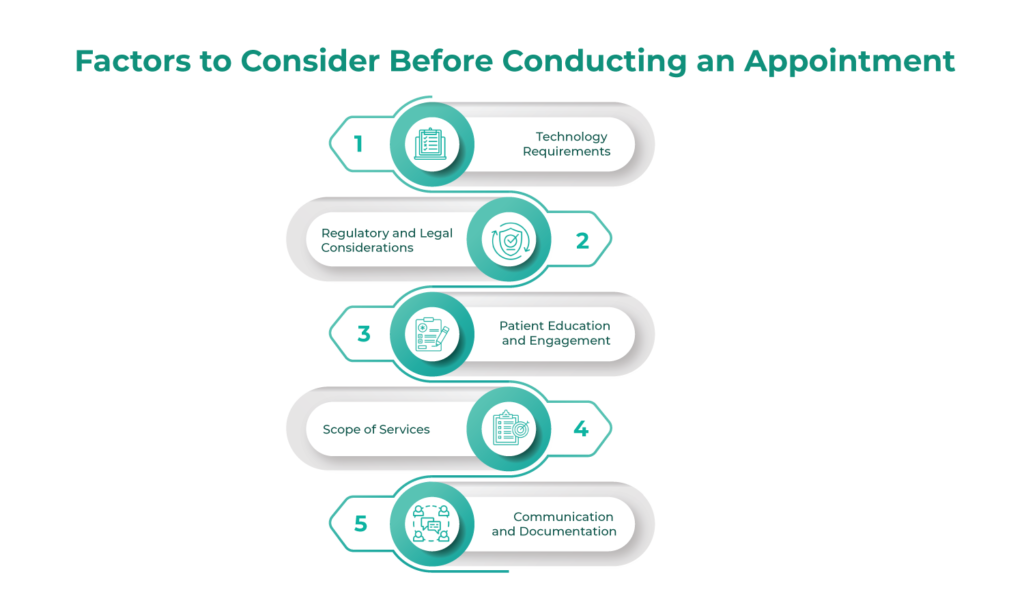
1. Technology Requirements:
Before starting the telemedicine appointment, ensure you closely assess all technological needs. Ensure you have a stable internet connection along with different devices like computers or tablets. Doctors must also have the equipment and secure telemedicine platforms to conduct virtual consultations.
2. Regulatory and Legal Considerations:
Understand all legal and regulatory requirements governing telemedicine practices. Understand reimbursement policies and licensing requirements. Also, make sure that telemedicine appointments meet all legal standards for protecting data security.
3. Patient Education and Engagement:
Inform patients about the telemedicine procedure, including how to use the telemedicine platform, make appointments, and prepare for online consultations. Give precise directions regarding the appointment’s expectations, privacy policies, and technology needs. Encourage active engagement from patients during virtual consultations by attending to their concerns and encouraging telemedicine.
4. Scope of Services:
Determine the scope of medical services offered through the telemedicine platform for doctor. Check if the patient is suffering from a condition that can be addressed remotely or not. Also, check the complexity of the healthcare problem and the availability of the procedures and tests.
5. Communication and Documentation:
Communication is the most critical factor regarding telemedicine appointments, as there is no in-person contact. Establish clear communication channels during telemedicine appointments. Communicate with patients about reminders, appointment scheduling, and regular checkups. Also, document the consultation and prepare a comprehensive care plan.
What is the Difference between Telemedicine and Personal Appointment?
Both these are exceptionally different, especially in the mode of delivery. On the one hand, where telemedicine appointments include virtual consultations conducted remotely. Personal appointments require patients to go to the healthcare expert clinic and get tailored solutions. Telemedicine appointments offer great accessibility, convenience, and flexibility, as no physical examination capabilities exist. Above all, telemedicine appointments promote greater privacy.
Preparation Tips Before the Telemedicine Appointment
1.Check your microphone, internet connection, camera, and the telemedicine platform.
2. Add all vital information, such as recent changes in the medications and healthcare conditions, allergies, and symptoms.
3. Note all must-ask questions from your health expert during the telemedicine appointment.
4. Log in to the telemedicine platform a few minutes before the set time so you do not miss the consultation.
5. Find a quiet place properly before starting the consultation.
6. Dress similarly as you dress during the in-person consultation.
7. Write down all key points, recommendations, and instructions from your health expert.
8. Communicate with your health expert regularly. Also, sharing your symptoms and changing health conditions.
Benefits of Hiring Telemedicine App Development Company
1. Expertise in Telemedicine Technology
Telemedicine app development company creates customized telemedicine applications. Further, they fulfill patient requirements. They deeply understand the telemedicine software and develop a feature-rich application while meeting all security standards.
2. Customized Solutions
Telemedicine app development companies work with several doctors to understand patients’ specific objectives and requirements. They build customized telemedicine apps to meet the organization’s unique requirements. Major features of a telemedicine app are:
- Virtual consultations
- Appointment scheduling
- Secure messaging
- Electronic health record integration
- Telemonitoring.
3. Compliance and Security:
Telemedicine app development companies offer telemedicine solutions for patients that meet all security requirements. These include:
- Health Insurance Portability and Accountability Act
- General Data Protection Regulation
Here, experts suggest strong security measures and access controls. Additionally, they offer encryption implementation techniques to safeguard patient data.
4. Scalability:
Telemedicine app development companies can construct scalable telemedicine platforms to accommodate growing user bases. Additionally, they feature enhancements and technological advancements. Telemedicine systems use scalable technologies and flexible architecture to adapt to changing healthcare trends and organizational needs.
5. Streamlined Development Process:
Telemedicine app development companies have an experienced team of developers with expertise in telemedicine technology. They follow a comprehensive development process and agile methodologies to deliver medicine solutions within budget and timely.

